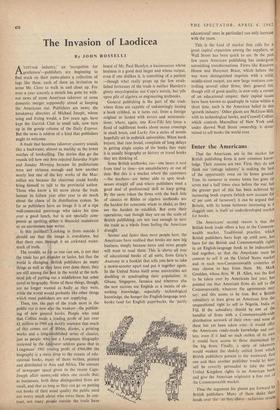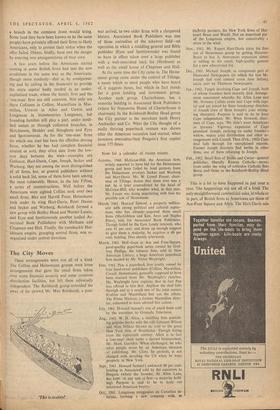Enter the Americans That the Americans are in the market
for British publishing firms is now common know- ledge. Their reasons are two. First, they do not think our 'cottage industry' is making the best of the opportunity even on its home ground. True, its turnover in money terms has gone up seven and a half times since before the war, but the greater part of this has been achieved bY increasing book exports (which now account for 42 per cent. of turnover); it can be argued that Britain, with its home turnover increasing at a sluggish rate, is itself an underdeveloped market for books.
The Americans' second reason is that the British book trade offers a key to the Common- wealth market. Traditional practice, which British publishers, have kept up until now, has been for the British and Commonwealth rights in an English-language book to be indissolubly tied together, so that the Americans must be content to sell it on the United States market and in such , non-Commonwealth countries as may choose to buy from them. Mr. Mark Goulden, whose firm, W. H. Allen, was the first to be taken over by Americans last year, has pointed out that American firms do sell to the Commonwealth, whatever the agreements maY say; and this seems to be true. But a British subsidiary at least gives an American firm the unquestioned right to sell to Nigeria, India or Fiji. If the subsidiary. should 4 one of the handful of firms with a Commonwealth-wide distribution network of their own—and none of these has yet been taken over—it would offer the Americans ready-made knowledge and out- lets; even if it had no such outlets of its own it would have access to those maintained bY the big firms. Finally, a spate of takeovers would weaken the shakily united front which British publishers present to the westward; first one and then another publisher would let him- self be covertly persuaded to take the mere United Kingdom rights in an American book and give the American originator a free run of the Commonwealth market.
Thus the argument for gloom put forward by British publishers. Many of them shake their a breach in the common front would bring. Some (and they have been known to be the same people) have privately offered their firms to likely Americans, only to protest their virtue when the offer failed. Others, finally, have met the danger by entering into amalgamations of their own.
A few years before the Americans started coming in some British firms had met the new conditions in the same way as the Americans, though more modestly—that is, by amalgamat- ing and by calling in the financiers to provide the extra capital badly needed in an under- capitalised trade, where the family firm and the 'one-man' firm are still common. Not only are there Collinses in Collins, Macmillans in Mac- millan, Unwins in Allen and Unwin and Longmans in bicentenarian Longmans, but founding families still play a part, under modi- fied names or through collateral branches, in Hutchinson, Hodder and Stoughton and Eyre and Spottiswoode. As for the `one-man' firms (in which one man has been the effective driving force, whether he has had complete financial control or not), they often date from the low- cost days between the wars—examples are Gollancz, Hart-Davis, Cape, Joseph, Seeker and Warburg; they are among the most distinguished of all firms, but, as general publishers without a solid back list, some of them have been among the most vulnerable. Hence, in the late Fifties, a series of reconstructions. Well before the Americans were sighted Collins took over two small firms, Bles and Harvill Press; Heinemann took under its wing Hart-Davis, Peter Davies and Seeker and Warburg; Reinhardt formed a new group with Bodley Head and Werner Laurie, and Eyre and Spottiswoode another (called As- sociated Book Publishers) with Methuen and Chapman and Hall. Finally, the ramshackle Hut- chinson empire, grouping several firms, was re- organised under central direction.



































 Previous page
Previous page